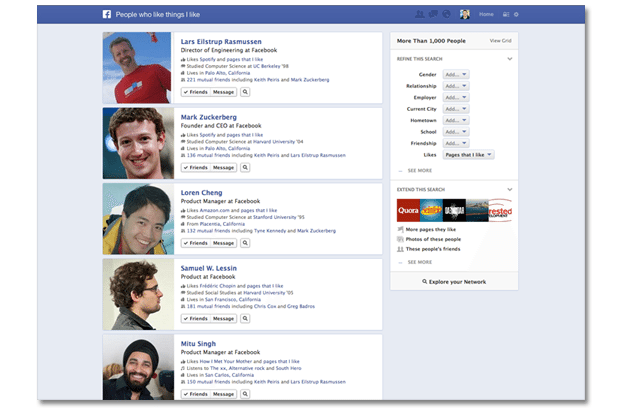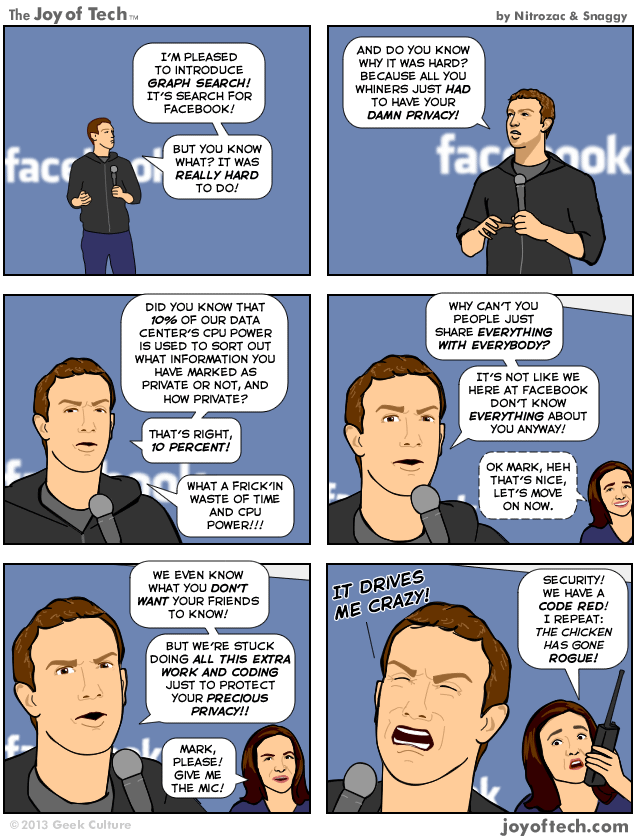“Today we’re announcing a new way to navigate [Facebook] connections and make them more useful,” Zuckerberg told an eager crowd at yesterday’s news conference. He then went on to pitch what many of us anticipated: a socially-oriented search engine that could make things easier for users and marketers alike. Operative word there being could.
What is Graph Search?
If your Twitter feed looks anything like mine, you’ve seen a constant stream of “What is Graph Search, Anyway?”-type articles in the past twenty four hours. Assuming that you looked into one or two, I’ll be brief with this introduction to the tool.

Graph Search lets users search for socially-based answers as compared to the the link-based answers offered by Google. Rather than taking traditional search algorithms into account, Graph Search looks purely at Facebook data in the form of likes and connections. In its first phase, the tool will focus on the interconnectedness of four entities: people, photos, places and interests.
Zuckerberg reiterated that this tool is built not for regular searches like “sushi Chicago,” but plain-language, socially-oriented queries such as “sushi restaurants in Chicago that are liked by people who like Eater Chicago,” or “tech publications that my friends who are programmers like.” It’s an entirely different vernacular with an entirely different outcome.
Is plain language, socially-tied search actually that appealing to the average Internet user? More on that later. First, let’s highlight the marketing implications of Graph Search.
How Social Graph could benefit marketers
Search algorithms lend more value to the like
Basic logic says that since Social Graph makes likes searchable, the more people who like a page, the better its chances for coming up in search. If seven of my friends like Little Pancake House and I search “pancake restaurants liked by my friends,” LPH is going to pop up. If none of my friends have bothered to show LPH love in the form of a Facebook like, that’s too bad — it has no (organic) opportunity to appear on the SERP. With Social Graph, Facebook is creating its own form of organic search based not on keyword density or link juice, but on connections earned through likes. Want good Facebook SEO? Get more likes.
Access to information about your audience
Assuming that people tell Facebook a decent amount of information about who they really are (although in most cases this assumption is overly-optimistic), Graph Search has the opportunity to serve as an information-rich market research tool. Rather than running that $10,000 survey on your audience just head to Facebook and type in “what books do CEOs like?” or “which restaurants do Northwestern University students like?” And for the community manager block, Graph Search offers the opportunity to feed the old social content pipeline with relevant content by asking Facebook for “publications (or what have you) liked by people who like [my company].”
Graph Search ads…coming soon?
Last but certainly not least, Graph Search opens up the opportunity to target users with something never before seen on Facebook: purchase intent. Say for example I’m casually scrolling through my Facebook newsfeed. I’m thinking about the photos of friends, upcoming event alerts, what have you. But what I’m not thinking is man, I really need a new pair of shoes. My purchase intent (or at least any digital signal thereof) is non-existent, so there’s little chance I’ll pay any attention to that shoe image I see in the sidebar ads.
But say I use this new Graph Search tool to search Facebook for “shoe stores in Chicago liked by my friends.” The assumption – and a fairly safe assumption at that – is that I’m on a mission to buy shoes. And with that, Wicker Park Shoe Store can fork over the ad dollars to rise to the top of my search results page. As Josh Constine of TechCrunch eloquently puts it, “where there’s discovery, there’s opportunity for sponsored discovery.”
But will Graph Search work?
All of these snazzy marketing benefits come with one giant caveat: people might not be willing change the way they search and/or use Facebook. Ultimately, the success of Graph Search hinges on whether or not people will actually use it — and to use it properly, they’ll have to adjust their online behaviors in several ways.
Search in a different vernacular
As Internet users, we are familiar with a very specific search language. For years we’ve been querying Google with nouns: “dry clearer River North,” “digital marketing agency” and so on. With Social Graph, Facebook is relying on users to change the way they think about search from disjointed nouns that lead to links to plain-language queries that ultimately lead to connections. During the news conference Tom Stocky, Director of Project Management at Facebook noted, “I wouldn’t normally think to search for this anywhere.” Welp, if this is a behavioral change for a Facebook project manager, can we really expect the ever-change-resistant mainstream user to adapt?
Like more stuff
Alright, so say a good percentage of “normal” Facebook users take the plunge and use the tool. Here’s another issue: are people — we’re talking non-marketers, non-Tech Crunch readers, etc. — are they really even liking enough things to connect this web of search? Sure, they have a good experience at the grocery store down the street, but I’d be willing to bet it never occurred to them to like that grocery store on Facebook. With limited likes there are limited connections, which ultimately means limited search results.
Facebook staff is hopeful that its new product will inspire a behavioral change in users. “There are now new reasons to make these connections,” said Director of Project Management, Tom Stocky. “We’re hoping the existence of that will encourage it.” Good luck with that, guys.
Privacy concerns
Let’s not forget to add user privacy concerns to the list of issues. The Facebook team assures us that nothing deemed private will appear in search, but I’d bet that the minute mainstream users find out about the tool, your Newsfeed will runneth over with cries of “creepy, Facebook” and “hands off my privacy.”

Craving further Graph Search saturation? Here are two of the best commentaries I’ve read thus far:
- Is Facebook Finally Useful? by Farhad Manjoo of Slate
- Graph Search Ads Could Be A Goldmine for Facebook by Josh Constine of TechCrunch